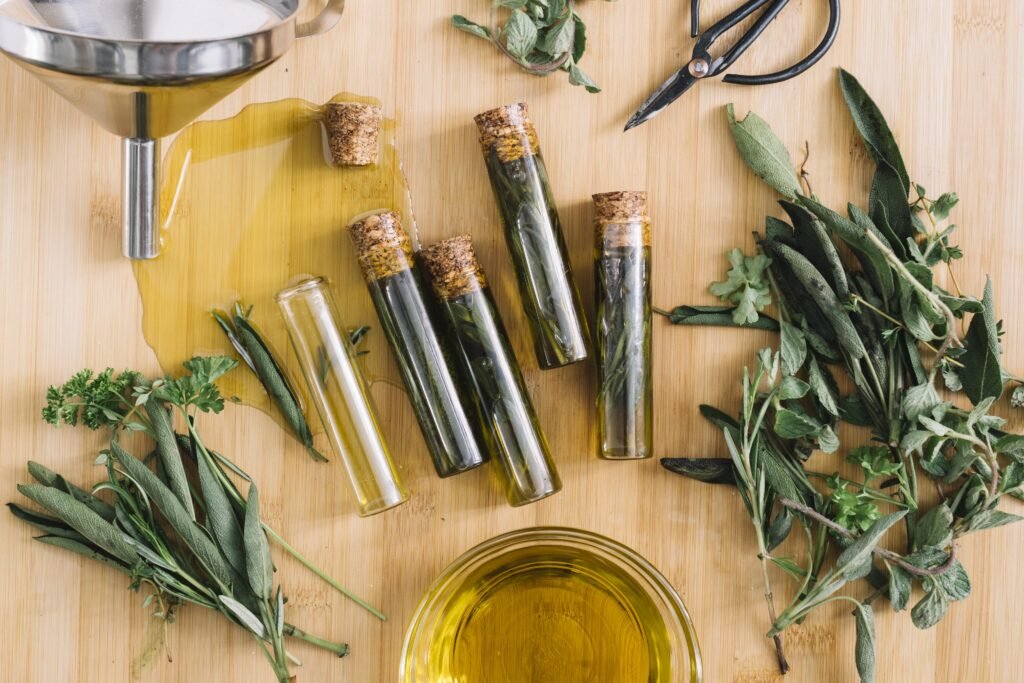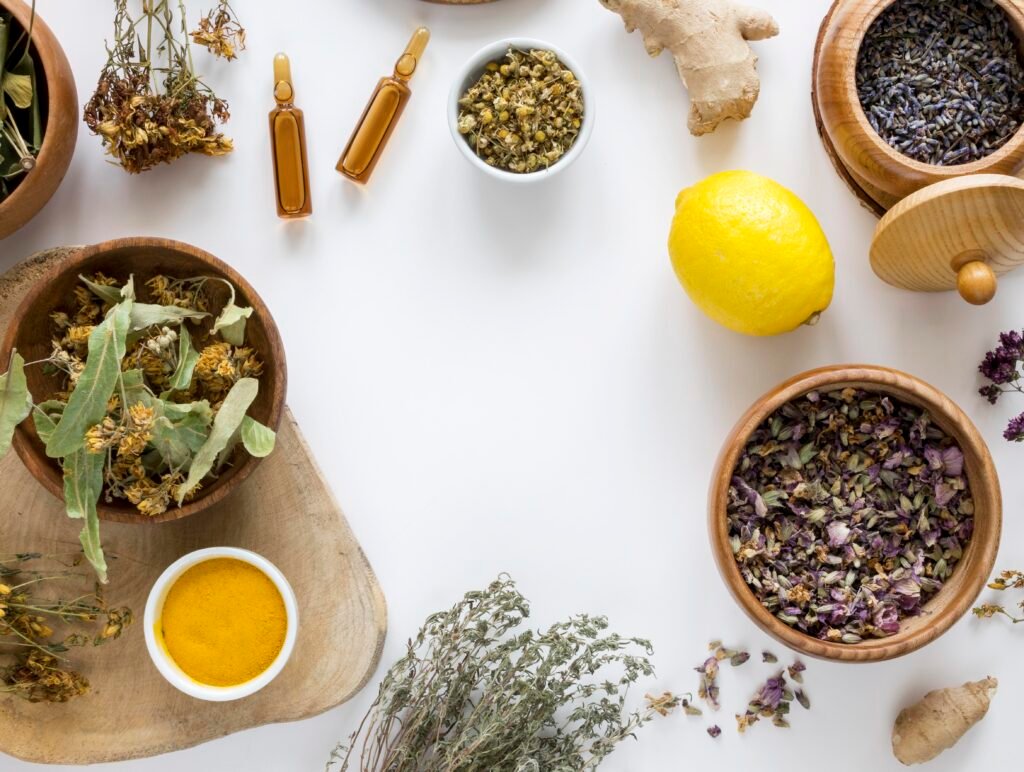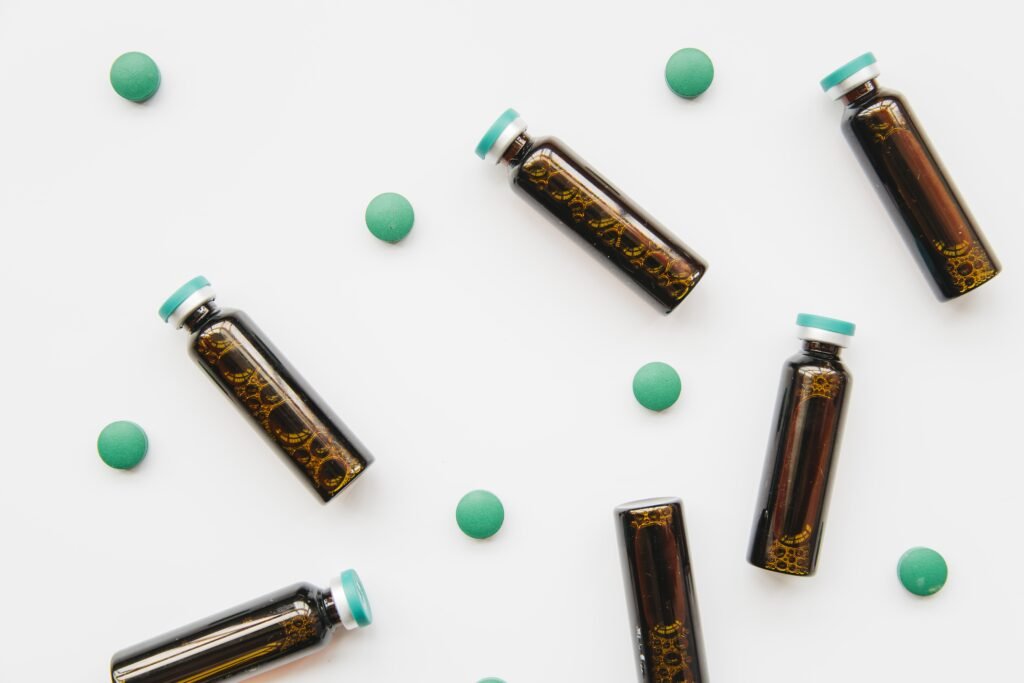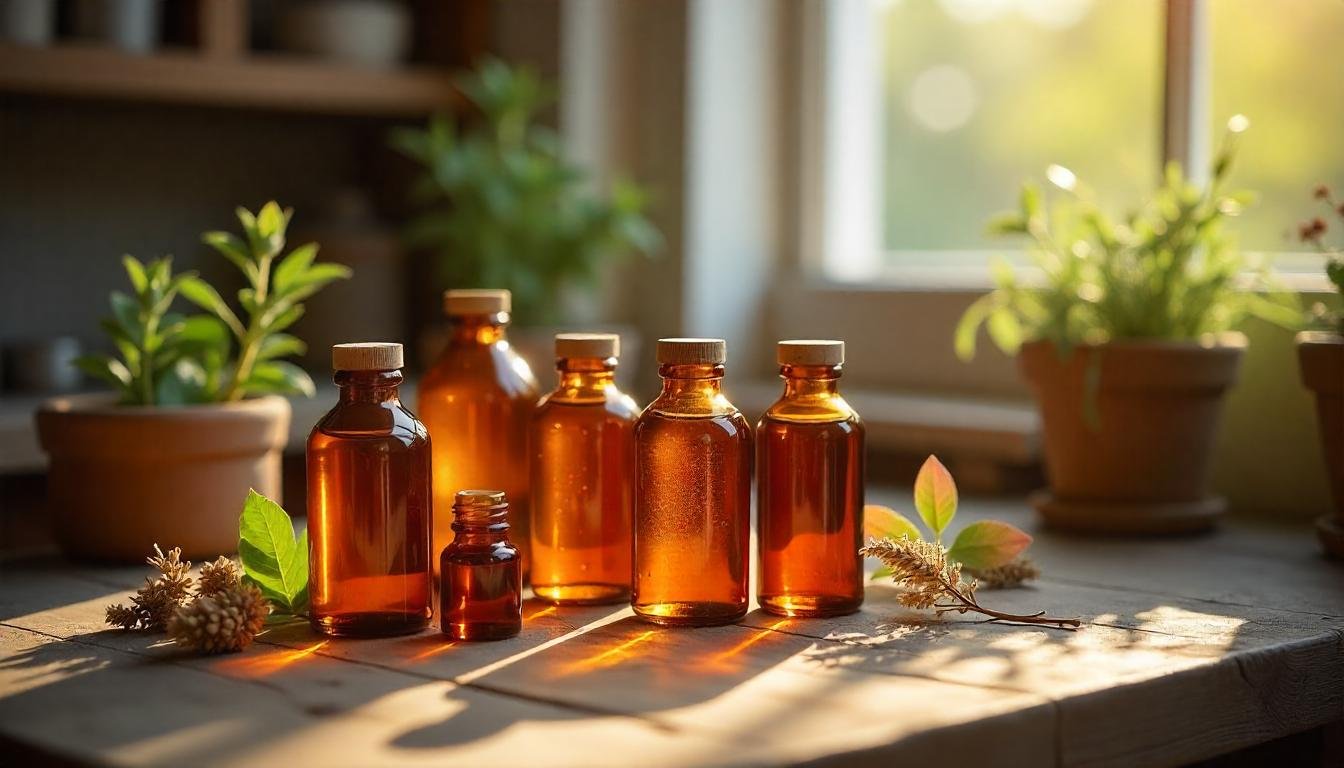Why I Swapped Pills for Plants
If you’re anything like me, you know the gut rules the game. A few years ago, I was popping antacids and probiotics, chasing a calm belly. Nothing worked for long. Then I stumbled into the world of herbal tinctures. Fast-forward to today — I make my own, my digestion is happier than ever, and I’m about to show you how to do the same.
This isn’t a magic cure. It’s about giving your gut gentle, time-tested support. If you’re tired of feeling bloated, sluggish, or off after meals, you might find that the plants your grandparents trusted still work best.
Stick with me — I’ll show you the exact herbs I use, how to blend them, what to avoid, and how to build a small daily routine that actually works. Start small. Trust your senses. And discover what a calm, happy belly really feels like.
Let’s get started — your gut will thank you.
Table of Contents
What Are Herbal Tinctures?

A tincture is a concentrated liquid extract made from herbs. It pulls out the plant’s beneficial compounds using alcohol (or sometimes glycerin or vinegar). Unlike teas, tinctures deliver a potent dose you can take in drops — easy to carry, easy to use.
For digestion, herbs like ginger, fennel, peppermint, and chamomile shine. They help break down food, calm cramping, and ease gas. You get pure plant power in a tiny bottle.
Why Make Tinctures at Home?
Store-bought tinctures are great but pricey. Making your own costs a fraction and lets you pick exactly what goes in. You control the quality, strength, and ingredients. Plus, it’s strangely satisfying — like bottling your own little potions.
The Best Herbs for Gut Health

Here’s my shortlist — herbs I swear by for a smoother digestive flow:
1. Ginger Root:
A king for nausea, bloating, and sluggish digestion. It warms the belly and helps food move along.
2. Peppermint Leaf:
Soothes spasms, calms gas, and freshens the whole gut.
3. Fennel Seed:
An ancient bloat-buster. It relaxes the digestive muscles and cuts down on cramping.
4. Chamomile Flowers:
Gentle, calming, and great for an upset stomach — especially if stress makes your gut rebel.
5. Dandelion Root:
A liver-loving, bile-boosting hero that helps break down fats.
How to Make a Basic Digestive Tincture

Making a tincture is easier than you think. Here’s my go-to method:
You’ll Need:
- Dried or fresh herbs (organic if you can swing it)
- 80–100 proof vodka or brandy (alcohol extracts best)
- A clean glass jar with a tight lid
- Cheesecloth or fine strainer
- Small amber dropper bottles
Step 1: Prep Your Herbs
Roughly chop fresh herbs or measure out dried ones. Fill a clean jar about halfway.
Step 2: Add Alcohol
Pour in enough alcohol to completely cover the herbs, plus an inch or so. Seal the jar tightly.
Step 3: Shake and Store
Label your jar with the herb name and date. Keep it in a cool, dark place. Give it a good shake once a day.
Step 4: Wait and Strain
Let it steep for 4–6 weeks — the longer, the stronger. When it’s ready, strain out the herbs through cheesecloth.
Step 5: Bottle It Up
Pour the tincture into dark glass dropper bottles. Store in a cool spot — it’ll last for years.
How to Use Digestive Tinctures Safely
Start small — 1–2 dropperfuls diluted in a little water before or after meals. See how your body responds. Not all herbs suit everyone, so listen to your gut, literally.
Simple Tincture Recipes for Common Digestive Troubles
Let’s get personal. Below are my favorite blends I keep stocked in my kitchen. These have saved me from countless nights of regret after rich meals or mystery takeout.
1. After-Meal Bloat Buster
What it’s for: Gas, bloating, that too-full feeling.
Key herbs: Fennel seed, peppermint, ginger.
Ingredients:
- 2 parts fennel seed
- 1 part dried peppermint leaf
- 1 part fresh or dried ginger root
- 80–100 proof vodka
How to make it:
- Lightly crush the fennel seeds to release more oils.
- Combine all herbs in a glass jar, filling it halfway.
- Cover completely with vodka, seal, shake.
- Let it sit for 4–6 weeks, shaking daily.
- Strain and bottle.
How to use: Take 1–2 dropperfuls in water after big meals. I carry a small bottle when I travel — it’s a lifesaver.
2. Calming Stomach Soother
What it’s for: Upset stomach, nausea, mild cramps.
Key herbs: Chamomile, lemon balm, ginger.
Ingredients:
- 2 parts dried chamomile flowers
- 1 part dried lemon balm
- 1 part fresh ginger, sliced
How to make it:
Same method — fill a jar halfway, cover with alcohol, shake daily for a month, strain, bottle.
How to use: I take a dropperful in warm water before bed if my stomach feels uneasy.
3. Liver & Digestion Booster
What it’s for: Sluggish digestion, fatty meals, mild detox.
Key herbs: Dandelion root, burdock root, ginger.
Ingredients:
- 1 part dried dandelion root
- 1 part dried burdock root
- 1 part ginger root
Same steps as above. Dandelion and burdock help your liver produce bile, which breaks down fats and keeps digestion smooth.
How I Pick the Right Tincture
Here’s my general rule:
- Feeling gassy or bloated? Fennel + peppermint = go-to.
- Stomach in knots? Chamomile + lemon balm.
- Heavy, sluggish belly? Dandelion root wakes things up.
I never use more than two tinctures at once. Too many herbs at once can backfire. Keep it simple — your gut will thank you.
DIY vs Store-Bought: Is Homemade Really Better?
Short answer: yes — if you do it right. Quality herbs, clean tools, and time are your best friends.
Store-bought digestive tinctures can be convenient, especially if you’re short on time or herbs. But watch for added fillers or sugar — you want pure, potent extracts, not flavored alcohol.
Homemade wins on cost, potency, and knowing exactly what you’re putting in your body.
Important Dos and Don’ts
I’m no doctor — just a real person who’s spent years swapping meds for plants. Here’s what I’ve learned (sometimes the hard way):
✅ Do test small. Start with half a dropperful to see how your body reacts.
✅ Do label everything. Date, herb, and alcohol type.
✅ Do store tinctures away from heat and light.
✅ Don’t skip medical advice. If you’re pregnant, on meds, or have a condition, talk to a trusted herbalist or doctor first.
✅ Don’t overdo it. More drops don’t mean faster relief.
My Personal Gut Routine
People ask: “Do you really use these every day?” Short answer: I rotate them. Here’s my real-life flow:
- Morning: warm water, maybe a splash of apple cider vinegar if I’m feeling sluggish.
- Before big meals: a dropperful of fennel-peppermint tincture in a shot of water.
- After dinner: if I’m bloated, a calming chamomile blend.
- Monthly: liver tincture for a gentle reset when my diet’s been heavy.
Nothing fancy — just small daily habits that keep my digestion moving and my belly calm.
Troubleshooting: When Your Tincture Doesn’t Turn Out
If you’ve made a tincture that smells weird, tastes off, or looks cloudy, don’t panic — here’s what I’ve learned about fixing or avoiding bad batches.
Cloudy or Moldy?
First, don’t confuse plant sediment with mold. Tiny bits floating or settling at the bottom are normal. Mold, however, looks fuzzy or slimy — and means toss it.
✅ Prevention tip: Always use clean, dry jars. Moisture trapped in fresh herbs can cause mold, so if you’re using fresh plants, chop them and pat them dry.
Tastes Too Strong?
Some herbs pack a punch — ginger and fennel can taste harsh if over-steeped. If your tincture is too intense, dilute your dose in more water or tea. You can also mix strong tinctures with milder ones, like chamomile, to balance the flavor.
Weak Potency?
If you use too little herb or steep for too short a time, you’ll get a weak tincture. Next time, pack the jar at least halfway with herbs, top with enough alcohol to fully cover, and give it time — at least 4 weeks is my sweet spot.
Forget to Shake It?
It happens — life’s busy. If you forgot to shake your jar daily, no stress. Just swirl it well when you remember. Regular shaking helps the alcohol reach every bit of the herb.
Tips for Busy Folks: Make Tincture-Making Easy
If you think you’re too busy for DIY, here’s how I keep it realistic:
- Batch It: I pick one weekend a month to prep a couple jars at once.
- Label Smart: A piece of masking tape with herb names and dates saves so much guessing later.
- Keep It in Sight: I store steeping jars in a cupboard I open daily — so I remember to shake them while grabbing coffee.
- Use Small Jars: Smaller batches mean faster use and fresher tinctures.
More Ways to Support Digestion Naturally

Herbal tinctures are one piece of the puzzle. If you really want to improve gut balance, combine them with small daily habits that make a big difference.
Eat More Bitter Foods
Bitters wake up your digestion. Before we all started eating packaged food, our ancestors naturally ate more bitter greens — dandelion, arugula, chicory. Bitter flavors signal your body to produce more digestive juices. Try adding a handful of bitter greens to salads, or sip a small tincture dose before meals.
Drink Plenty of Water
Obvious, but so overlooked. Dehydration slows digestion and leads to constipation. If you feel bloated and heavy, try a glass of warm water with lemon before blaming your gut.
Chew, Really Chew
Modern life makes us inhale our food in five minutes at a desk. Chewing well is the cheapest digestion tip out there — your stomach doesn’t have teeth. Give it a break.
Mind Stress
Your brain and gut are best friends. Chronic stress tightens your belly and slows digestion. Herbal tinctures help, but so does deep breathing, a walk outside, or just eating without screens for once.
How I Blend Gut Habits with Herbal Help
On busy weeks, I stick to these basics:
- Morning: Warm water + gentle stretching.
- Meals: Small portions, chew well.
- Night: Herbal tea or a calming tincture if my belly’s off.
- Weekly: One heavy meal? Take my bloat-buster tincture right after.
No perfect routine, just consistent small habits. My digestion is way better than when I depended on random over-the-counter pills.
Sharing the Practice: Gifting Homemade Tinctures
One of my favorite things is gifting tiny bottles of homemade tinctures to friends. I label them with cute tags and instructions. They’re unique, personal, and way more thoughtful than another scented candle.
Easy DIY Gift Idea
- Pick a small amber dropper bottle.
- Fill with your best batch (peppermint and fennel is crowd-pleasing).
- Add a handwritten label with the name, what it’s for, and dosage.
- Tie a piece of twine around the neck — done.
Building Your Own Herbal Cabinet
If you fall in love with making digestive tinctures, you might want to expand your herbal shelf. Here’s what mine looks like right now:
- Digestive basics: Ginger, peppermint, fennel, chamomile, dandelion root.
- Extras: Lemon balm, burdock root, milk thistle (good for liver support), licorice root (great for soothing).
- Tools: Strainer, funnel, dark glass bottles, sharp knife, clean cutting board.
I restock dried herbs every six months to keep them fresh.
My Honest Results: How Herbal Tinctures Changed My Gut
When I started making tinctures, I didn’t expect huge changes. But over time, I noticed:
- Less bloating after heavy meals.
- Fewer sudden stomach cramps.
- Better regularity — if you know what I mean.
- Feeling more in tune with what foods do to my body.
It’s not an overnight fix. It’s slow, steady support. Nature’s pace, not Amazon Prime.
Take Action Now
If you’ve read this far, your gut’s already telling you something. Pick an herb — ginger, fennel, chamomile — and give it a shot. Make a tiny batch this weekend. Label it, shake it, strain it, taste it. See how it feels.
Your digestion will thank you. So will your wallet. And maybe one day, someone will knock on your door asking for a dropperful of that magic blend you made yourself.
Final Thoughts: Start Small, Listen Well
Herbal tinctures changed how I care for my gut. They’re not a cure-all — but they help your digestion do what it’s designed to do. Start small, trust your senses, and enjoy the ritual of making something good with your own hands. If this sparks your curiosity, dig deeper. Read books on herbalism. Join a local foraging walk. Talk to an herbalist. Your body’s natural balance is worth the effort — and the more you know, the better your tinctures get.
Your gut will notice. Your wallet might thank you, too.
FAQs: Quick Answers to Common Questions
Can I take digestive tinctures every day?
Yes — in small, safe doses, many people take digestive tinctures daily to keep their gut running smoothly. I personally use my fennel and peppermint blend a few times a week after heavier meals. Just remember: herbs are powerful. Start slow, see how your body reacts, and take breaks now and then so your system doesn’t get too used to it.
When is the best time to take a digestion tincture?
Best time? Right before or after meals. Bitters and carminative herbs (the ones that calm gas) work well when your stomach is getting ready to digest. Some people prefer to take liver-supporting tinctures (like dandelion root) first thing in the morning to help the body wake up.
What’s better for bloating: tea or tincture?
Both help — but tinctures are stronger and faster. Teas are gentle and soothing, especially for stress-related stomach issues. If you’re feeling bloated after a meal, a few drops of a fennel-ginger tincture can help faster than sipping tea, but combining both is even better.
Are digestive tinctures safe while pregnant?
Some herbs are safe during pregnancy, some are not. For example, peppermint tea in small amounts is usually fine, but concentrated tinctures can be too strong. Always check with your doctor or a trained herbalist if you’re pregnant or nursing.
How do I know if my tincture is working?
You’ll feel it — fewer cramps, less bloating, smoother digestion. The change can be subtle at first. Keep notes on how you feel before and after meals. For some, the difference is noticeable within a few days; for others, it’s a gentle shift over weeks.
Can kids take digestive tinctures?
Mild herbal teas are safer for kids than tinctures with alcohol. If you want to give kids herbal support, look for glycerin-based extracts or brew a gentle tea like chamomile. Always check with a pediatric herbalist or doctor first.
Do I need to use vodka for tinctures?
Vodka works best because it’s clear, affordable, and extracts a wide range of plant compounds. Brandy is also great and adds a richer flavor. If you avoid alcohol altogether, glycerin or apple cider vinegar are good substitutes, but they won’t pull out as many properties.
What’s the best herb for digestion?
There’s no single best — it depends on what’s going on in your gut. Ginger is top-notch for sluggish digestion and nausea. Fennel is my go-to for gas and bloating. Chamomile soothes stress stomach. Dandelion root is gold for fatty meals and liver sluggishness.
